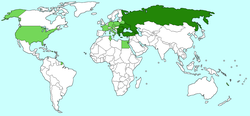Black Sea Economic Cooperation
 Flag of the BSEC |
|

|
|
| Members |
Neighboring countries Bulgaria Georgia Romania Russia Turkey Ukraine Non-neighboring countries Albania Armenia Azerbaijan Greece Moldova Serbia States with observer status European Union Egypt Germany France Israel Italy Croatia Austria Poland Slovakia Czech Republic Tunisia United States Belarus |
| Time zones | UTC +1 and +2 |
The Black Sea Economic Cooperation , SMWK (English Organization of the Black Sea Economic Cooperation, BSEC ) is a regional economic organization.
background
It was founded in Istanbul on June 25, 1992 on a Turkish initiative . It includes the six countries bordering the Black Sea and six other states. The SMWK encloses a population of approx. 300 million and an area of approx. 20 million km².
Organs of the BSEC are:
- Council of Foreign Ministers
- Permanent International Secretariat (PERMIS), based in Istanbul
- Parliamentary Assembly (PABSEC)
- Economic Council (BSEC BC)
- Black Sea Trade and Development Bank (BSTDB)
- International Black Sea Study Center (ICBSS)
The Black Sea economic cooperation aims to promote peace, stability and prosperity in the region through economic cooperation. Customs duties and non-tariff barriers between member states are to be reduced, and border formalities are to be harmonized. The States undertake investments and joint banking and financial associations with the aim of a regional securities - Stock Exchange to promote. They also want to work together in the areas of environmental protection , transportation, energy and telecommunications, science, technology and agriculture. The members of the BSEC also want to cooperate on questions of internal security, the fight against terrorism and organized crime .
Over the years it turned out that the interests of the member states were very heterogeneous . The efficiency of economic cooperation was increasingly called into question within the organization. The lack of concrete goals, priorities and long-term projects, the lack of own funds and the failure of the plan to win major projects for the region were criticized. Important objectives and adopted resolutions have not been sufficiently implemented, it said. There is also a lack of coordination and control in the member states, which makes the bureaucratic effort all the greater.
In 1998 the network of Black Sea universities was established within the framework of the BSEC .
At its meeting in Istanbul in 2001, the BSEC therefore adopted an agenda ( BSEC Economic Agenda for the Future: Towards a more consolidated, effective and viable BSEC partnership ), which deals with how cooperation can be consolidated, made more efficient and more viable .
In 2004 the Black Sea Border Coordination and Information Center was opened in the Bulgarian port city of Burgas . The center collects information about illegal activities in the Black Sea region and promotes the exchange of information between the coast guards of the neighboring countries.
In 2007 it came into the focus of the new European neighborhood policy in the east and the Black Sea synergy .
Another focus of activities after the financial crisis of 2009 is the promotion of entrepreneurship and in particular reporting on the development of small and medium-sized enterprises in the region. To this end, there is a collaboration with Erenet , in which workshops are held regularly.
Individual evidence
- ↑ European Commission: Communication from the Commission to the Council and the European Parliament. (PDF; 443 kB) The Black Sea Synergy - A new initiative of regional cooperation. European Commission, April 11, 2007, accessed on August 25, 2011 (German).